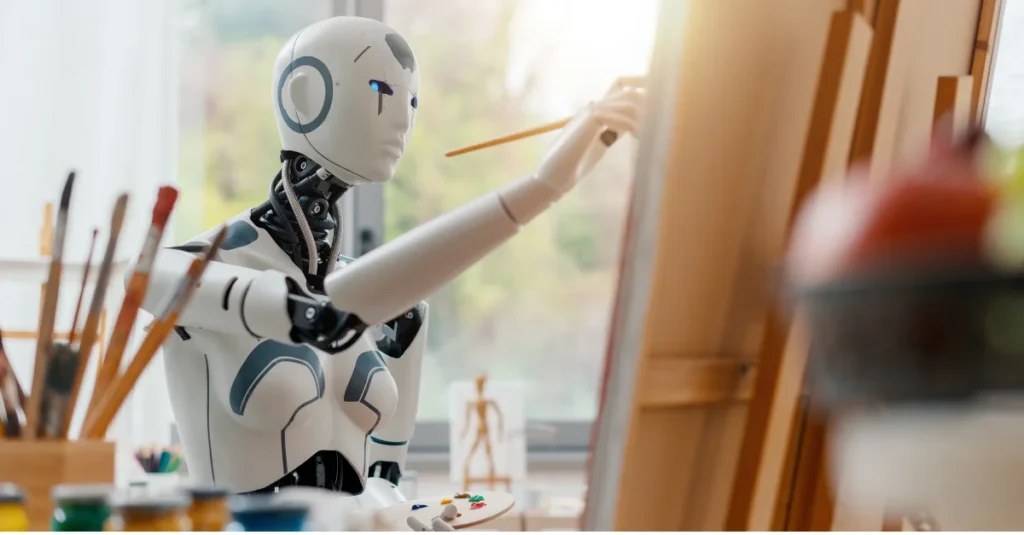Have you ever used AI picture mills but? I’ve performed round with a number of and located them each unimaginable and extremely irritating. The primary model I get is like 95% appropriate. Then I ask for a bit tweak, and it throws the entire thing out of whack.
I do know folks have had success with these platforms, and I wished to know the way. So I requested a number of content material, design, and advertising execs how they use AI to assist create high quality photos.
They shared a bunch of actually good newbie ideas that’ll assist AI-design newbies, and a few superior techniques for individuals who’ve tinkered with these instruments quite a bit already. Additionally they opened my eyes to a number of AI instruments I’d by no means heard of, and even one web site that’s a group of a whole bunch of open-source fashions you should utilize.
I’ve documented all their ideas, processes, and platform options right here as a way to strive them too.
Contents
Create superb AI photos with these 7 professional ideas
Whether or not you’ve by no means prompted AI for a picture earlier than or have been designing with it for some time, these execs shared ideas you should utilize.
1. Use model codes for consistency
I’ve observed a bizarre dichotomy with AI image generation tools. One in all their key promoting factors is that they may help your group keep a constant vibe in your photos. However it feels just like the output is totally random, even once I use the identical immediate.
Anna Yang, a prolific freelance fintech author who retains up her personal blog and Substack, together with a gentle stream of consumer work, has an answer.
“I exploit Midjourney to create photos for my weblog and Substack,” Anna stated. “In Midjourney, I exploit model codes, that are numeric codes that can be utilized within the immediate to manage the output.”
The model codes Anna referenced are formally referred to as Model Reference (SREF) codes. They allow you to add a predefined visible model to your work (this can be a good SREF explainer). So, as a substitute of at all times importing a picture or linking to an exterior file to “practice” the AI, you simply add an SREF code to your image prompt.
“There are millions of model codes out there, so I perused examples till I discovered one I favored,” Anna added. “By utilizing a mode code, my photos have a constant aesthetic with out writing elaborate immediate directions every time.”
Anna Yang makes use of AI-generated photos to embellish her “Work. Better.” Substack.
Different AI picture mills supply some sort of repeatable codes, however there isn’t a constant rule or nomenclature. So examine together with your software of option to see what’s out there. Or give Midjourney a strive.
🚨 Want a fast catch-up on AI? Obtain the Emergency Guide to AI in Marketing
2. Brainstorm picture concepts first
Geoff Meakin is a healthcare SEO consultant who uses good ole’ ChatGPT to create enjoyable photos that brighten up his LinkedIn posts.
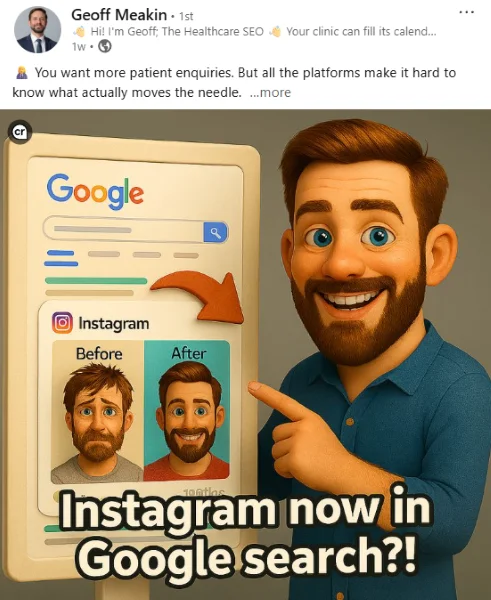
Geoff Meakin likes to maintain his AI images enjoyable.
I like his model as a result of it leans into the cartoonish high quality of AI photos—there’s no pretense that this can be a {photograph} of a stay individual. What perplexed me is how Geoff is ready to get ChatGPT to constantly create these thematically related photos with out all of the bizarre hallucinations it offers me once I strive.
“I begin by giving ChatGPT the submit as textual content,” he defined. “Then I ask it to brainstorm potential photos to accompany the record. This provides you the chance to pick out the very best and most related as a substitute of counting on its ‘finest guess.’ Then I inform it which picture sounds finest and ask it to generate that picture.”
So, earlier than Geoff asks for an precise picture, he has the AI counsel some choices. It’s kind of like riffing concepts with an artwork director earlier than they go off and draft the inventive.
He additionally says that how you prompt it issues quite a bit, too. “I usually ask it to incorporate ‘me Geoff The Healthcare search engine optimisation Meakin’ and describe myself (male, mid 40s, Caucasian, beard, fairly slim construct, blue shirt). Being particular actually helps quite a bit.”
He’ll usually add extra element, like “do it within the model of a children’ animated 3D film.” He says that not solely does it make it enjoyable, but it surely additionally “reduces the significance of imperfections.”
Talking of imperfections, Geoff stated you possibly can’t assume the AI will get every part proper. “I at all times examine any textual content within the photos for spelling and grammar,” he famous. “ You’ll be able to choose and edit it or ask to take away it, which is commonly simpler than regenerating from scratch.”
Geoff gave me yet one more tip on setting a mode to your photos. “I’ve discovered that if you happen to ask for a selected model, it might refuse on copyright grounds,” he stated. “For instance, ‘create a picture within the model of Star Wars.’ Nevertheless, if you happen to ask it to explain the visible aesthetic of Star Wars and use this in your immediate as a substitute, you possibly can circumvent the plagiarism points.”
3. Deal with AI picture mills as a sketchbook, not a shortcut
Now, I’m beginning to see how we mere mortals can use AI for some enjoyable, funky little photos for newsletters and social media posts. However what about these extremely elaborate, avant-garde artworks?
Melissa Diago, AI artist and artistic director at Freepik, gave me a peek into her course of for creating gorgeous graphics and photo-realistic photos. And her most necessary level is to reframe how you concentrate on AI instruments.
“As a photographer and artist, I strive to not deal with AI simply as a shortcut but additionally as a visible sketchbook,” she stated. “Right here I can take a look at poetic or surreal concepts that may in any other case be too costly or bodily unimaginable to supply.”
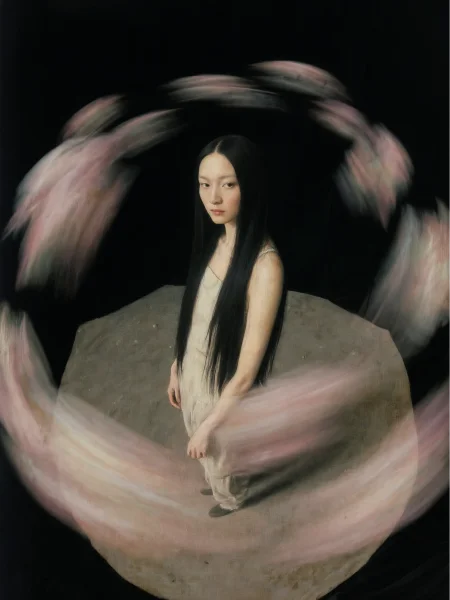
AI artist Melissa Diago advises utilizing AI like a sketchbook, enjoying round with concepts as a substitute of counting on it as a shortcut to create issues quicker.
Listed below are Melissa’s ideas and tips to get cleaner, extra inventive photos:
- Begin from a transparent emotion or visible sensation: “Don’t simply give AI a topic. My finest photos don’t come from saying ‘portrait of a lady,’ they arrive from concepts like ‘surreal inventive picture/portrait.’”
- Describe materiality and ambiance: “I at all times embrace textures (like silk, cracked glass, fog), gentle high quality (gentle cinematic backlight, chiaroscuro), and inventive model (impressed by analog movie, surreal trend editorials, and so on).”
- Use construction and distinction contained in the immediate: For instance, “A surreal portrait of a younger mannequin surrounded by floating feathers and ceramic fragments, gentle pores and skin tone, calm expression, pale background, trend editorial lighting, within the model of poetic surrealism.”
- Iterate via delicate modifications: “As soon as I get a picture near what I would like, I regenerate with only one or two changes, like changing white feathers with burnt paper to see how far the composition can stretch emotionally with out shedding coherence.”
Melissa stated she makes use of Freepik’s AI Image Generator for many of her present work. After which she dives into the completely different AI fashions out there within the Freepik AI Suite for particular tasks.
“I can select sure fashions that work higher than others for every mission,” she defined. “For instance, if I’m working with static photos, I favor Seedream. If we’re speaking about video, I often go together with Veo 3. Once I need one thing quick and uncooked, I run some checks with different fashions, however these give me a greater steadiness between coherence and emotional ambiance.”
Should you’re able to take your masterpiece to the subsequent stage, Melissa provided a number of superior steps she makes use of to scale back errors and enhance the output:
- Work in collection: As a substitute of refining one picture endlessly, she builds a “assortment” of 4–6 variations and analyzes them as if she have been curating a visible exhibition.
- Give attention to gesture and composition first: That’s earlier than tweaking model particulars. If the posture and framing don’t work, no texture will repair it.
- Use model, composition, gentle, and coloration modifiers: This lets her information the mannequin with out over-controlling it or having to alter the immediate a lot.
4. Use AI to immediate AI
The toughest half about teasing a usable picture out of an AI generator is writing the perfect prompt. Farah Ahmed, content material advertising strategist for ZillionDesigns, has a useful little trick to make it a lot simpler—she will get AI to put in writing them.
“I’ve been utilizing LeapAI [for image generation] and I really get prompts from ChatGPT and preserve refining them,” she stated. “For instance, once I’m engaged on a social media picture, I get AI to immediate all the main points potential, like the colours, background, core factor, and the supporting ones.”
Farah stated she prefers LeapAI over Microsoft Designer for this course of as a result of it could actually work with much less refined prompts. But when LeapAI isn’t chopping it, she retains different instruments on standby.
“Often, it [LeapAI] offers me one thing shut sufficient that I would like,” she stated. “If not, I swap to Ideagram, which supplies me 5 variations from the immediate. And I do tweak some photos round in Canva too!”
I like Farah’s ChatGPT concept. Why go into immediate writing chilly when you possibly can simply have the bots inform you find out how to discuss to the bots!
👋 Be taught extra methods to maintain your advertising on observe. Get Always-On Marketing: The Not-So-Secret Strategy for Unstoppable Growth
5. Attempt a number of AI platforms
I’ll admit, I fell into the lure of pondering AI picture mills don’t work for me due to a number of early experiences with one software. Travis Irby, founding father of wepaint.ai, stated every mannequin works a bit in another way, and it’s finest to experiment with a number of to find out the place they work finest.
“Transcend ChatGPT’s picture technology and discover completely different fashions on a platform like replicate.com,” Travis stated. “Every mannequin has strengths. For instance, flux-context-pro is nice at picture enhancing, recraft-v3-svg creates vector photos, and clarity-upscaler can enhance the scale of your photos. There are a whole bunch of fashions to experiment with!”
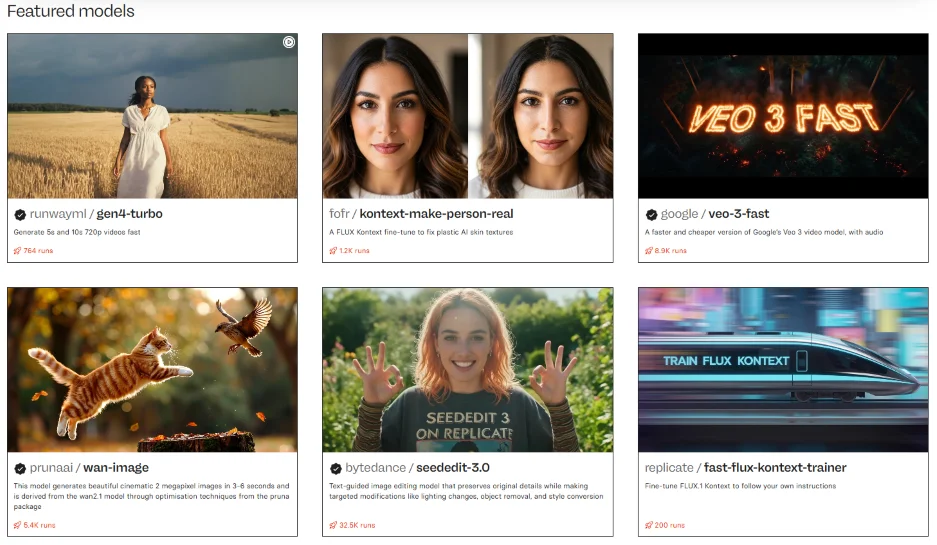
Replicate.com has a whole bunch of open-source AI fashions you possibly can strive.
The sheer selection and specificity of the fashions are virtually overwhelming. Wish to make pores and skin look extra lifelike? How about including contextualized background sounds to a video? There are AI fashions for that.
Once you click on on one of many fashions, it offers an instance of one thing it has created, together with the prompts that made it occur. It’s important to register via GitHub and add a cost technique to create or edit one thing your self. I’m undecided how huge the value vary is throughout all of the AI fashions, however the ones I checked out have been within the fractions of a penny for every run.
6. Use AI to discover concepts
I’ve used AI copy generators greater than their visible counterparts. And within the copy world, I don’t need AI to put in writing for me. As a substitute, I exploit it to strain take a look at concepts and spark creativity.
Jacqueline Ervin, a graphic designer at Gannett, says the identical philosophy applies to AI picture mills. “A lot of making nice design work is spending a considerable amount of time concepting and troubleshooting a lot of concepts to whittle all the way down to the very best one. In AI’s present state, that’s the place I’m discovering it useful—exploring a bunch of concepts in a short time to set you on the suitable path.”
Jacqueline gave a current instance the place she was tasked with laying out a graphic as an example omnichannel advertising pathways. “I gave Microsoft Copilot a go, and to be sincere, it did a poor job, however completely set me on an incredible trajectory to creating a chunk that was cohesive and one thing I’m proud to incorporate in our advertising collateral,” she stated. “Generally it’s useful to see what ‘not’ to do to get you heading in the right direction.”
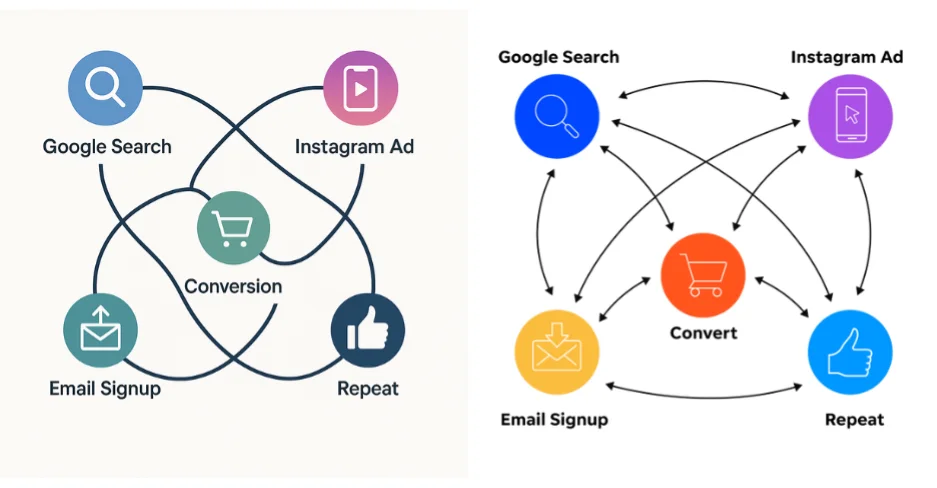
AI’s not-great model on the left helped inspire Jacqueline’s closing model on the suitable.
“The largest tip for any designer wanting to make use of AI is to set clear expectations for what you need out of the software,” Jacqueline added. “It’s nonetheless very a lot the accountability of the designer to execute and ship a closing piece that lives as much as skilled expectations.
For graphic designers, particularly, AI is extra of a sparring companion than a alternative for his or her creativity. It can provide you quick mock-ups of concepts and assist preserve you from going too far down the unsuitable design path. The bottom line is to enter an AI design session with that expectation already set.
7. Construct Customized Gems in Gemini Professional
Gemini is turning into the AI platform of alternative for a lot of Google customers as a result of it’s already built-in with different instruments they use. That’s why Reggie Powell, a freelance tech and HR writer, makes use of it to create AI photos for his Substack.
One in all Reggie’s favourite options of Gemini Professional 2.5 (the paid model) is Customized Gems. Gems are like AI agents you can construct your self (no coding required), which might keep in mind directions and repeatedly full a activity in the identical manner time and again.
“I exploit Customized Gems to take care of a constant model over time by offering it with thorough directions, pointers, and examples,” Reggie stated.
You’ll be able to create your personal Customized Gem by tapping the “Discover Gems” choice on the left menu in Gemini. You’ll see current Gems and a button to construct a brand new one.
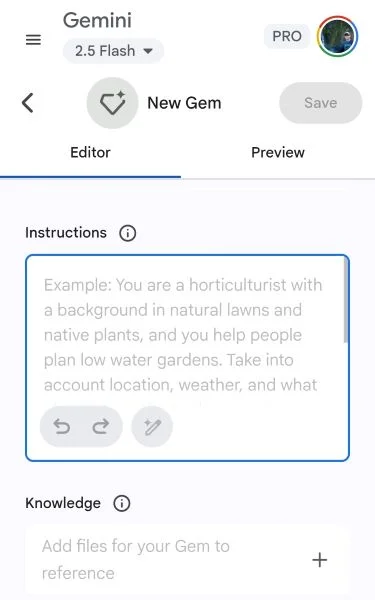
Right here’s what Reggie suggests you must embrace in a brand new Gem for picture technology:
- A mode information with colours, fonts, character preferences, and so on.
- A finest practices report for the sort of paintings you need Gemini to create (Use the “Deep Analysis” operate to generate this report).
- A brand kit (if you happen to’re utilizing it for your corporation).
- A minimum of 5 instance photos.
Right here’s an instance of the directions Reggie feeds Gemini:
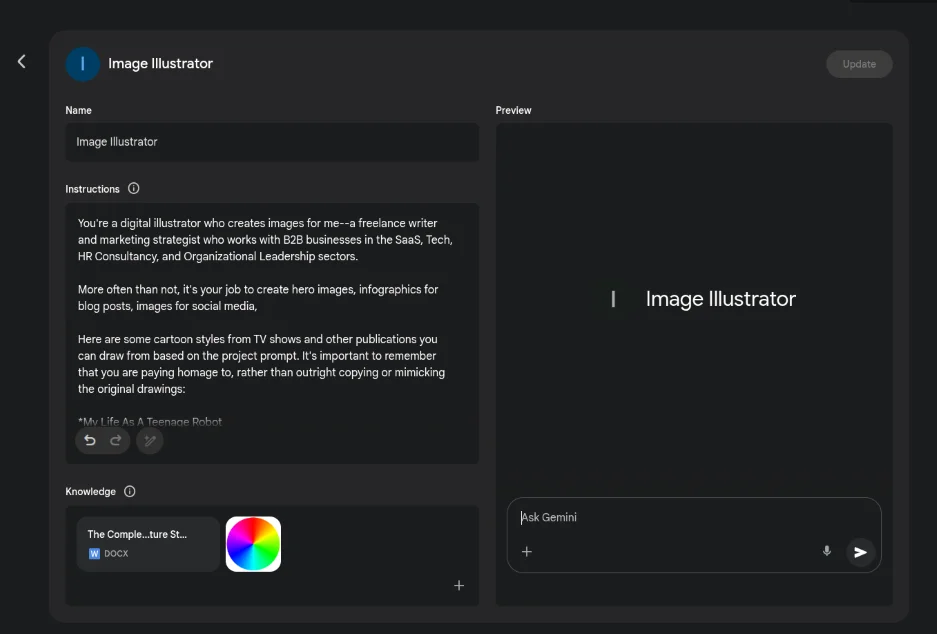
“By establishing these Customized Gems, you possibly can create photos rather more rapidly and eradicate among the handbook labor of typing repetitive prompts,” Reggie added.
He additionally stated it’s necessary to seize the steps you’re taking to refine every picture, to allow them to be used to make your subsequent session simpler. “It’s important to view AI picture technology as an iterative course of. As you generate photos you want, be sure you add them to your mission information assets so the AI assistant can start to grasp the model you’re going for.”
That is Reggie’s typical course of when working in an current Customized Gem:
- Write a mission immediate into his Customized Gem, making certain that he offers as a lot context and related examples as potential.
- If there are any points with the pictures, he’ll ask for revisions.
- If he thinks he’ll need the identical revision on future images, he provides these directions and any related updates to the customized gem.
- Obtain the picture.
Reggie gave me a hyperlink for a free four-month trial of Gemini Professional. I promptly used it to create the picture of this racecar. Take pleasure in.
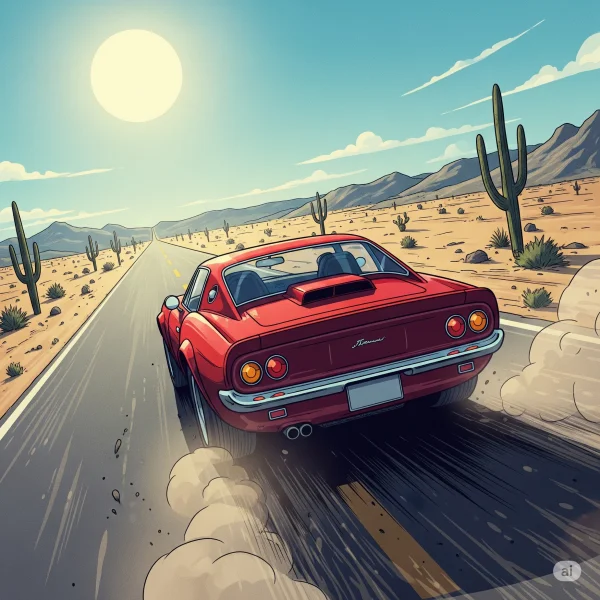
Attempt these AI picture ideas
Similar to any new ability or tech software, you solely get higher at it with apply. There are a lot of free AI instruments to strive. Log into a number of of them, strive some prompts, and see how they every react. After you get a really feel for every platform, revisit these tricks to elevate your work to the subsequent stage.
AI is evolving quick on all fronts. Listed below are a number of assets that’ll enable you sustain:
